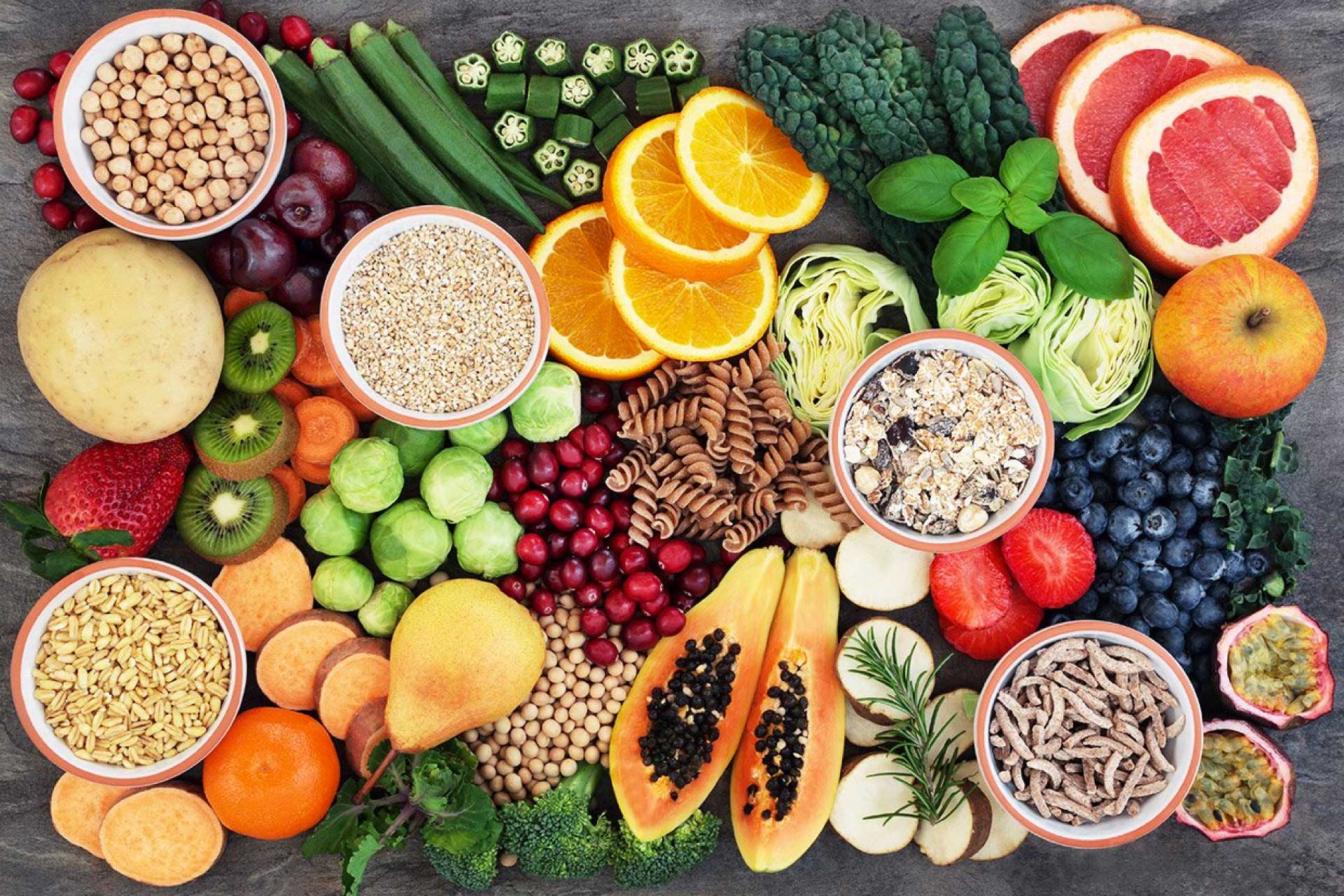We are 6 days into the programme. Has anyone had any “die off” symptoms such as headaches, rashes, and lacking energy? This is very usual and will pass.
I finished yesterday´s daily blog by stating that daily pooping (2-3 times is great!) is important for the final stage of detoxification, called ELIMINATION.
It is in this step of elimination that fibre becomes a vital player.
There are many reasons for including fibre in your diet to improve your health. However, more research is pointing to the differences among the different fibres, which may just mean that it is important to think about what type of fibre you consume…as well as ensuring you consume a variety so you really do benefit from all the possible health benefits, including aiding in the elimination of toxins.
A simple definition of fibre is a carbohydrate that humans cannot digest, but our gut microbiome can break down some types (read on……)
Although it may not be broken down and absorbed for nutrients, it does play a key role—actually several—in health and wellness. Plant foods (including fruits, vegetables, beans, legumes, whole grains, seeds, and nuts) contain fibre, although there is not just one singular type of fiber. Fibre can be broken down into two main categories:
-
Soluble fibre – The type which water mixes with to create a gel-like substance in your intestines. It aids in many areas of health, including helping to keep you full longer and reduce blood sugar spikes.
-
Insoluble fibre– Generally the type that passes through as is, being used to bulk up your stool to aid in its passage and elimination. You may have heard this colloquially called roughage.
Additional fibre classifications include fermentable or non-fermentable as well as viscous or non-viscous. The fermentable and non-fermentable categories address whether the commensal bacteria in your gut use the fiber as a fuel source or not.
Both soluble and insoluble fibers can be used as fuel sources, although it is more common in soluble fibers. Viscous and non viscous refers to the thickness of the gel-like substance formed from water and soluble fiber. The more viscous, the longer it sits in the gut, which further aids in slowing down digestion so you maintain feeling full longer.
A key role of fibre is to aid in the elimination of toxins. It does this in a few different ways. One way is simply by binding to bile to remove them from the body. Fat-soluble toxins are more likely to be eliminated this way since they will be bound up in bile. Fibre also aids in the elimination of heavy metals through directly binding to them and then moving them through the system and out of the body. Other toxins may also bind directly to fibre rather than bile for elimination.
In today’s world, there is an array of environmental toxins we are exposed to that can cause oxidative stress and other harmful effects upon the body. Although some people do not present with any negative side effects of this exposure, other people quickly find they reach their toxic burden limit. In addition to the direct health impact of environmental toxins, they also can harm the gut microbiome, another reason why fibre may play a role in reducing their effects.
No matter where you fall on this spectrum, it is important to maintain a proper functioning elimination route for your waste, including environmental toxins, endotoxins (the toxic byproducts of certain pathogenic bacteria in the gut), and endogenous waste (toxins produced internally such as hormones and metabolic waste).
A few common toxins in today’s world include:
-
Benzene
-
Brominated flame retardants (BFRs and PBDE)
-
Dioxins
-
Formaldehyde
-
Heavy metals (cadmium, lead, mercury, arsenic)
-
Persistant organic Pollutants (POPs) – Polychlorinated Biphenyls (PCBs) and organophosphate pesticides such as DDT
-
Pesticides and herbicides (glyphosate and others that resemble this one)
-
Plastics (BPA, phthalates, etc.)
-
Polycyclic aromatic hydrocarbons (PAH) – air pollution
-
Solvents
Ultimately, consuming fiber from a variety of fibre sources, including both soluble and insoluble and fermentable and non-fermentable, will ensure you have a variety of fiber to aid in eliminating different toxins and protecting your gut microbiome from any negative impact from toxins.
They may even work synergistically to enhance your detoxification capabilities.
3 “A” star FIBRE RICH & Liver supporting foods:
- Asparagus – contains the prebiotic fibre called inulin. Peak availability in spring 😊 – Asparagus has the highest amount of naturally occurring glutathione, essential for detoxification. They also contain vitamin C , folate (B9) and vitamin K, To preserve the antioxidants, try roasting, steaming or sautéing your asparagus.
- Artichokes also contain the prebiotic, inulin. The original use of artichoke since ancient times has been as an aid for indigestion and insufficient liver function. Research has shown very significant improvements in liver and bile malfunctions using artichoke extract. Also rich in magnesium, potassium and folate
- Apples contain the probiotic fibre called pectin, a soluble fibre found in the skin. Pectin is able to bind to toxic, heavy metal ions such as arsenic, cadmium, lead, and mercury in the gastrointestinal tract to reduce their absorption and bioaccumulation and aid in their elimination from the body.A prebiotic (cellulose and hemicellulose) is also in apples in fact, Most of the fiber in an apple is insoluble. Apples need to be bought organic as their skins retain any sprays in agriculture practices. Rich in vitamin C.
Store them in the refrigerator away from soft fruits and vegetables.
